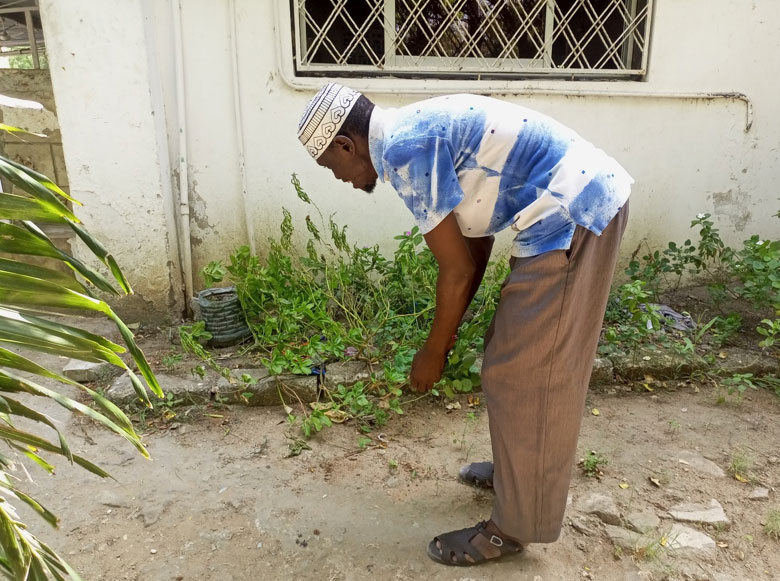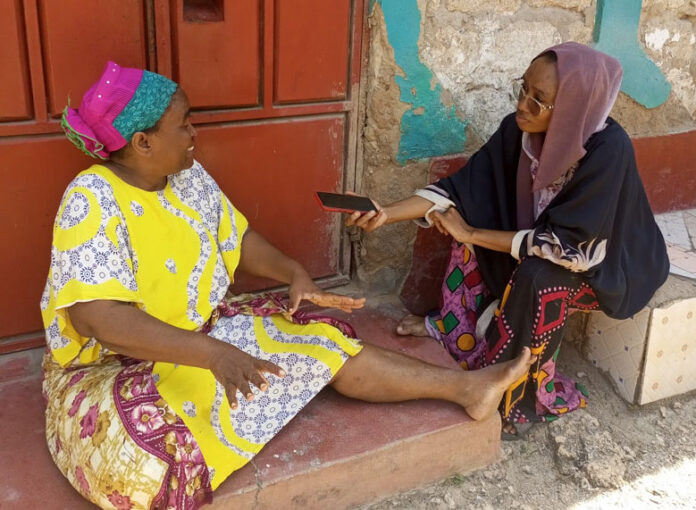By Sophia Abdhi, DevReporter, Mombasa County

Mombasa is one of the old cities in Kenya and for centuries it has been known for being a peaceful and harmonious town with safe streets to stroll along at daytime, in the evening and even in the hours of the night.
This has been the reality until a decade back when the growth of the city saw the coming of different people of different cadre and different lifestyles into the city.
The history of peace was somehow changed and people could hear unfortunate stories of crimes like terrorism, drug trafficking, forceful disappearance and gang robberies, with some being committed by underage residents.
“Mombasa residents are known to be kind and welcoming to their neighbors and visitors, but at a point somewhere along the line, I think people took these for granted. Bad elements were then able to infiltrate our communities and now bad practices are portraying Mombasa people differently”, said Shakur Khamis- commonly known as Mzee Shakur, a village elder in Vanga Estate village in Likoni sub-county, Mombasa.
Mzee Shakur narrates how at one time, they would walk from one village to another for football tournaments and would come back home very late without worries of being mugged by criminals or robbed of their belonging. Also during the months of Ramadhan (a holy month in Islamic calendar where Muslim observe fasting from morning to down before breaking their fast), Mzee Shakur says that Muslim did a lot of prayers at night in the mosques, event then and would come back home very late without a problem.
When the rain started beating us (referring to the current breakdown in matters security), is still an unsolved puzzle and currently one has to be extra careful while walking in some areas of Mombasa. The security multiagency department has even put LIKONI, KISAUNI OLDTOWN and some parts of Changamwe under hotspot of criminal activities.
Crime rate
According to statistics from the national police service, crime level in Mombasa is at 71.26 percent, indicating an increase in the last 3 years.
Common crimes in Mombasa are armed robberies with violence, drug abuse related cases and physical assaults.
Many have related these to an increase in juvenile gangs especially in Mvita, Likoni and Changamwe sub counties. These sub-counties lead in cases where juvenile gangs have been attacking people using machetes while robbing them.
Solution to the criminal cases
This DevReporter sought to find out from the community members about their views on what exactly could help curb the increasing cases of insecurity, especially those committed by juvenile group’s member.
Afua Bakari a community-policing leader known as Mzee WA nyumba kumi in Mtaa wa Makkah, a village in Likoni, says that the community should accept the reformed juvenile members and help them find something to do so as to avoid idleness.
“let’s learn to forgive them even if one of them once robbed you or committed a crime, for as long as he has reformed. Let’s help them because they will also help the rest of the gang members to change.”
In the process of conducting the interview with Mrs. Afua, two young boys came running while holding two containers, making this DevReporter to jump, almost flying to the front door for her life, only to realise that they were recovered items that had been stolen from a nearby shop.
She expressed her joy after hearing that some of the boys have reformed and she wished something like that could happen in her own area that is known for hosting notorious young boys whose parents even seem determined to sell their household property to raise bail for their release every time they are arrested. Ironically these are the same parents who say that they can’t pay fees to keep the juveniles in school, subsequently leading them into life of crime.
For the past 3 months, several criminal gang members have been surrendering to either local security personnel, community leaders or police administration. A good example is James Mbugua alias Mohammed Mbugua, 35 years, who used to be in one of the most notorious gang harassing people on the street with weapons like machetes and knives, stealing from anyone they came across.
Mbugua narrates how he found himself in Mombasa hustling for a job to feed his siblings back home in Limuru, after they become orphans.
“I stated the criminal activities in Nairobi but there seems to be too many groups there and I opted to move to Mombasa hoping to change my ways of living, but things got more tough in Mombasa and that’s why I joined the gang located in Mombasa CBD area known as ‘Maboxini,” narrated Mbugua with regret.

Mbugua recalls the countless times he has been in police custody and corridors of justice, and the numerous times he has escaped death in the hands of furious community members and victims of their crimes, but ultimately, always going back to the Maboxini area to nurse his wounds, before going back to the streets.
Close to Maboxini area is a perimeter wall housing a community sports facility and a mosques commonly known as Serani grounds Mosque. Here, this DevReporter meets Sheikh Zubeir Hussein, one of the co-founders of Serani sports grounds, a member of Mombasa elders association and the chairman of Kibokoni Social Help Society known as KISHESO.
Sheikh Zubeir narrates how he has been in the frontline of talking to the juvenile gang members in Maboxini and the old town areas, from where many of the members come.
“I have received many boys who want to reform and change for a better life and away from gang life in which many indulged in drug abuse, believing that this helps them in carrying out the criminal activities,” said Sheikh Zubeir.
Sheikh Zubeir says that as a community, they have tried talking to them directly but the most challenging part is that once reformed, they fear being known to the police and the community. This is because it is alleged that the unreformed gang members often came after them to punish them for betraying the gang. At the same time, it is also alleged that the police harass the reformed boys, forcing them to name other group members or owning up to crimes they never committed.
“ A youth does not belong to the parents alone, but rather it is the society’s collective responsibility to take care of its youth in order to have a peaceful society,” says Zubeir.
As the community of Serani sports ground, we decided to help the youth in Maboxini, especially when the county government destroyed their places of shelter after recommendations from the community members.

Zubeir and his team came to rescue some of the youth, mentor them and help them out of the gang groups, where some of them were being murdered in cold blood, allegedly either by police or civilian
It is during one such points that Zubeir met Mbugua who was desperate for shelter, and through the assistance of the community, Mbugua accepted to change for the better.
“I would like to appreciate the Serani community for taking me in and helping me change my bad ways. I willingly accepted to convert to Islam and I was even given a job to sustain myself and my family back home, who had given up on me”, Mbugua said.
Dispute his efforts to change for the better, Mbugua intimated that he still get followed by some of the gang members to rejoin the group since as they say, he used to be their lucky charm. He narrates a recent case where three of his former members were murdered in cold blood after robbing a woman along Ganjoni streets and left her in a pool of blood. They then took off after the robbery while chanting their song of “mission accomplished”. Unknown to them, armed policemen were waiting for them with guns cocked along Ganjoni roundabout. It is there that they met their deaths.
The latest utterance from the inspector general on the “shoot to kill” order on the notorious boys seem to have fuelled a conversation even at the village level, with many believing that it is the reason why their children have decided to reform and abandon the gang groups because they fear being killed in the act.
Sheikh Zubeir, Madam Afua, and Mbugua are all in agreement, and are grateful to the communities they come from for taking up the responsibility for the youth, with the aim helping them get out of the criminal gangs. This will help in creating a safe place for all, since as they say, “charity begins at home”.
“More community organisations are needed to empower the youth. The government also needs to strengthen all its security department because the trend has changed as it now seems that more crimes are being committed in the villages than in towns or even more criminals are hiding in the villages after committing numerous crimes in the big cities”
In madam Afua own words, “our villages should not be a dumping site for criminals, but rather a safe place free of crime”.






